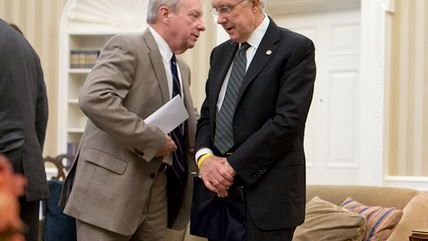Harry Reid Sells Out Dick Durbin, Democratic Party Soul
What's left of it

An attempt was made recently to sell the U.S. Senate subdivision of Democratic Party real estate to Manhattan money changers. A contract was brokered by the Senator from Las Vegas, Harry Reid, for his protégé, the Senator from Wall Street, Chuck Schumer, passing over the Democratic Whip, the Senator from Illinois, Dick Durbin, for leadership in what used to be called the greatest deliberative body in the world.
The deal can't be closed until the November 2016 election, which will determine exactly who gets to sign the papers transferring ownership from Reid to Schumer. So there's still time to foment a little revolution.
This does not surprise. It comes when the nouveau riche Chicago, Arkansas and Westchester County Hillbillies, Hillary and Bill Clinton (swimmin' pools, movie stars, investment bankers, foreign donors,) seek a new lease on the presidential wing of the Democratic Party, their old place at 1600 Pennsylvania, operated for several decades by the New York money changer, Goldman Sachs.
News that Schumer might replace Reid left some Democratic party stalwarts as emotional as Linda Richman, visited by just-like-buttah' Barbra on SNL's "Coffee Talk." We were as verklempt as Schumer reportedly became when Durbin told him he had "earned" the promotion.
We free market Jeffersonian Democrats are talking among ourselves, wondering if the donkey side of the House of Representatives duplex may also be for sale. But a quick look at Federal Election Commission listings suggests much of Democratic House property seems to be taken, brokered by Washington's K Street lobbyist Realtors. (Closing prices searchable at OpenSecrets.org.)
Having gone a real estate metaphor too far, let me continue.
I came from Mt. Vernon, Illinois to the District of Columbia—68.3 square miles surrounded by reality—in 1975, as press secretary to newly elected Democratic Congressman (and later Senator) Paul Simon, a principled Progressive Era politician, and mentor to Durbin.
Since arriving on Capitol Hill, I've been watching the center of Democratic Party gravity shift from the farming and manufacturing Midwest, the progressive Boston-based northeast enclaves, and the independent-minded, populist Rocky Mountain and Pacific West Coast. The party of the Little People has been drifting toward the money manipulating Big People in the urban East, to those who risk other peoples' savings in the seven blocks of Lower Manhattan known as Wall Street.
The political tectonic plates have been shifting slowly, so gradually, indeed, that few seem to be noticing the earthquake that's shaking the Democratic Party from its historic embrace of working poor and lower middle class Americans.
In the 1980s, Democrats cozied up to New York bankers. After elections in 1992, William Jefferson Hamilton Clinton (sic) all but deeded the White House to the 70th Secretary of the Treasury, Robert Rubin, who was at Goldman Sachs for 26 years. Rubin's deputy, Larry Summers, succeeded him as Secretary at the end of the Clinton Administration. Summers later became a paid speaker to Goldman Sachs, and returned to Washington as economic policy advisor to President Barack Obama in 2009, after the former chairman of…drum roll…Goldman Sachs!, Henry Paulson, labored as George W. Bush's Treasury Secretary from 2006 to 2009.
Upon Rubin's retirement in 1999, Clinton called him the "greatest secretary of the Treasury since Alexander Hamilton," the founding father who created Wall Street.
The web is tangled, dark and deep. Some who still call ourselves Democrats are saddened by the slow slide of a once greater party, which I served as a 9-year-old in 1956 helping my mother drive Democrats to the polls, and for which I was a press spokesman for its national committee, 1983-87.
Listen up New Yorkers. This ex-Jefferson County Illinois, aging Democrat boy is verklempt. Mucho verklempt. Get your greedy hands off my party! Listen up Democratic Senators. You don't have to swallow this deal!


Show Comments (94)